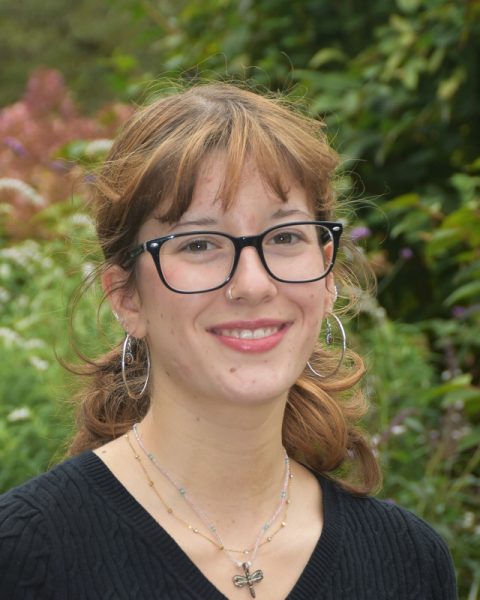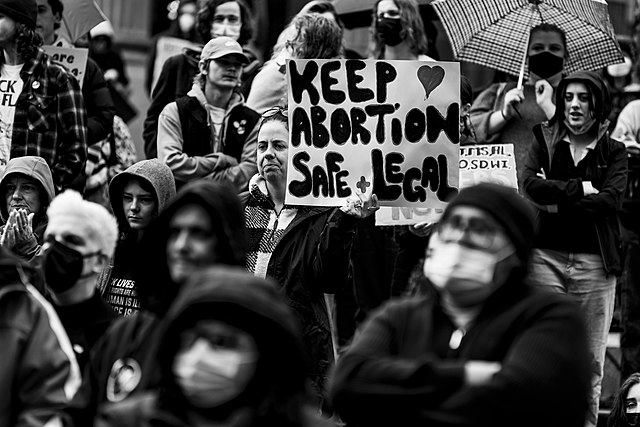What Roe v. Wade Taught Me About Activism
Photo courtesy of Wikimedia Commons.
In November of 2019, I went to the State House to advocate for the Roe Act to state senators and representatives. Now that the overturning has been leaked to the public, I am thankful that I advocated when I did.
The Roe Act was passed in Massachusetts two years ago, making abortions more accessible, specifically to teenagers. It permits minors over age 16 to get an abortion without parental or judicial approval.
In certain situations, including fatal abnormalities, the law also allows abortions up to six months of pregnancy.
For Jews that choose to have a bar or bat mitzvah, often one is required to complete a bar or “bat mitzvah project.”
I decided to advocate for the Roe Act.
My parents were not the only ones that accompanied me to the State House. My friend Ariza Leigh also shared my interest in abortion rights, and she expressed a wish to come with me to advocate.
“I absolutely believe we made a difference,” Leigh told me. “I think that there is something so powerful about being confronted by the younger members of society because the reality is we are the ones who will have to live with the outcome no matter what that outcome will be. And that is exactly what we represented.”
The beginning of my interest in women’s rights was in 2016 when my mom and I traveled to Washington DC to protest at the Women’s March. It was truly a wonderful experience. I felt so empowered to be cheering and shouting with hundreds of other people. We were all there for the same thing, and that was moving.
Going to the State House was an experience I will never forget. My dad is a lawyer, and he is friends with one of our state senators, Jamie Eldridge who I have known since I was pretty young. He connected me with a couple of other senators and representatives, and soon enough, I was going to the State House.
After that, I began hurriedly researching the topic. I gathered information from a variety of resources and prepared for the interviews with much enthusiasm. It felt spectacular to be a 12-year-old that was dealing with issues that held as much controversy as abortion rights.
I met with Senator Cynthia Creem, Representative Ruth Balsar, and Representative Kay Khan. They all seemed very excited that I was there, they said that they had met a bunch of people doing the same thing as me, but that I was by far the youngest person they had met.
Leigh told me she was nervous at first, not knowing what to expect.
“However, after meeting with the first representative I could only be excited. There was something so thrilling about being there and advocating for the entire state of Massachusetts in that way,” Leigh said. “It meant so much to me because I went on to do similar things with other issues.”
When Leigh and I went to the State House, we never predicted the possibility of abortion rights being overturned, only three years later.
Roe v. Wade was a case in which the Supreme Court ruled that the Constitution allows anyone to have an abortion if they choose so, without the restrictions of the government. It began in 1970 when Jane Roe decided to question Henry Wade and instate a new law that allows women to choose whether they wish to terminate a pregnancy or keep it. This applies only to women in the first trimester; after 24 weeks of pregnancy, abortion is no longer legal.
According to Supreme Court Justice Samuel Alito in a Politico article, “Roe was egregiously wrong from the start. Its reasoning was exceptionally weak, and the decision has had damaging consequences. And far from bringing about a national settlement of the abortion issue, Roe and Casey have enflamed debate and deepened division.”
Following 1973, there have been challenges against Roe v. Wade, but no successful overturnings. In 1992, Planned Parenthood of Southeastern Pennsylvania v. Casey determined that if an “undue burden” is put on a woman due to the limitations on abortion rights, that is unconstitutional. Regardless of this law, Mississippi decided to ban abortions following the 15th week, but the Supreme Court demolished it in 2021. In 2016, Whole Woman’s Health v. Hellerstedt diminished a Texas law that held unrealistic requirements over abortion clinics. It wasn’t until May of 2022 that a draft written by the Supreme Court was leaked, stating that the Court had voted to overturn Roe v. Wade and Planned Parenthood v. Casey
If Roe v. Wade is overturned, this means that abortion rights will be decided by the state government, not the federal. If so, this means that half of the states will most likely outlaw abortion. This throws the work of many women and activists over fifty years down the drain. According to Vanessa Romo in the article Massachusetts Senate Overrides Veto, Passes Law Expanding Abortion Access, due to the provisions that were implemented by the Roe Act in 2020, abortion will remain legal in Massachusetts.
Leigh told me the possible overturning made her feel nervous for our country, especially what it could mean for other protective laws for women’s rights.
“I’m also happy that we did something when we did, however, I’m trying to err on the side of caution because nothing is forever and this is one of the things in our country that no one can seem to agree on,” Leigh said. “I just hope that Massachusetts stays smart and keeps this bill in place.”
John Gerstein and Alexander Ward state in the article Supreme Court has voted to overturn abortion rights, draft opinion shows, although the draft has been leaked, it isn’t final until it’s published, which is likely to occur in the next few months. During this time, Supreme Court members can change their vote if they wish, which leaves us with some hope. The Supreme Court has never, in modern history, published a draft while the case was still pending, which adds even more controversy to one of history’s most controversial cases.
My experience with the Roe Act taught me that our individual actions count more than you might think. All around the US, people are protesting with the hope that the Court will reconsider their decision. If one judge changed their vote it could overthrow the entire court’s decision. Your voice could impact the whole country, so speak up.






















































